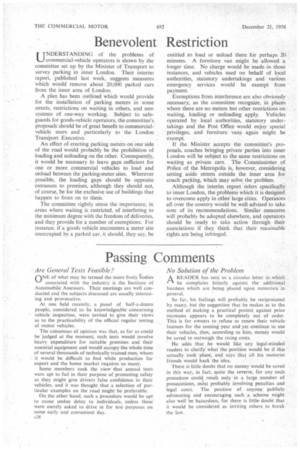Benevolent Restriction
Page 30

If you've noticed an error in this article please click here to report it so we can fix it.
UNDERSTANDING of the problems of UNDERSTANDING of is shown by the committee set up by the Minister of Transport to survey parking in inner London. Their interim report, published last week, suggests measures which would remove about 20,000 parked cars from the inner area of London.
A plan has been outlined which would provide for the installation of parking meters in some streets, restrictions on waiting in others, and new systems of one-way working. Subject to safeguards for goods-vehicle operators, the committee's, proposals should be of great benefit to commercialvehicle users and particularly to the London Transport Executive.
An effect of erecting parking meters on one side of the road would, probably be the prohibition of loading and unloading on the other. Consequently, it would be necessary lo leave gaps sufficient for one or more commercial vehicles to load and unload between the parking-meter sites. Wherever possible, the loading gaps should be opposite entrances to premises, although they should not, of course, be for the exclusive use of buildings that happen to front on to them.
The committee rightly stress the importance, in areas where waiting is restricted, of interfering to the minimum degree with the freedom of deliveries, and they provide for a number of exemptions. For instance, if a goods vehicle encounters a meter site unoccupied by a parked car, it should, they say, be entitled to load or unload there for perhaps 20 minutes. A furniture van might be allowed a longer time. No charge would be made in those instances, and vehicles used on behalf of local authorities, statutory undertakings and various emergency services would be exempt from payment.
Exemptions from interference are also obviously necessary, as the committee recognize, in places where there are no meters but other restrictions on waiting, loading or unloading apply. Vehicles operated by local authorities, statutory undertakings and the Post Office would enjoy special privileges, and furniture vans again might be exempt.
If the Minister accepts the committee's proposals, coaches bringing private parties into inner London will be subject to the same restrictions on waiting as private cars. The Commissioner of Police of the Metropolis is, however, considering setting aside streets outside the inner area for coach parking, which may solve the problem.
Although the interim report refers specifically to inner London, the problems which it is designed to overcome apply in other large cities. Operators all over the country would be well advised to take note of its recommendations. Similar measures will probably be adopted elsewhere, and operators should be ready to take action through their associations if they think that their reasonable rights are being infringed.




























































































